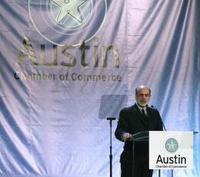Bernanke: U.S. slump may drag down Texas economy
December 2, 2008
Although the Texas economy is strong and diversified, it may not escape damage from a weak national economy that will continue to struggle, Federal Reserve Chairman Ben Bernanke warned Austin business people Monday.
Written by Clay Robison, The Houston Chronicle

Federal Reserve Chairman Ben Bernanke, in Austin on Monday, says the recent intervention by the federal government will restore confidence in the financial system.
AUSTIN — Although the Texas economy is strong and diversified, it may not escape damage from a weak national economy that will continue to struggle, Federal Reserve Chairman Ben Bernanke warned Austin business people Monday.
He predicted that recent intervention by the federal government, including the $700 billion bailout of private companies, will help restore confidence in the financial system and eventually lead to economic recovery.
Bernanke, in an address to the Austin Chamber of Commerce, also said additional interest-rate cuts were "certainly feasible" but noted the Fed's key interest rate, already at 1 percent following a series of earlier reductions, can't go much lower.
"At this point the scope for using conventional interest rate policies to support the economy is obviously limited," he said.
Gov. Rick Perry, who met with Bernanke before his speech, also praised the Texas economy. But he, too, cautioned the business leaders that rougher times may be ahead.
"The fact is we're not an island. Our economy is interlaced with the other 49 states," he said. "We're certainly starting to feel the effects of this meltdown, and we expect that they will increase."
Heavy hand of government
Perry said 250,000 new jobs were created in Texas between October 2007 and October 2008, while 500,000 jobs were being lost in the United States.
But the unemployment rate in Texas, while still almost a full percentage point lower than the national rate, has been rising in recent months. Seasonally adjusted, it was 5.6 percent in Texas in October, up from 4.7 percent in July.
The U.S. unemployment rate in October was 6.5 percent, compared with 5.7 percent in July.
Perry spokesman Mark Miner said the governor met privately with Bernanke and Richard Fisher, president and CEO of the Federal Reserve Bank of Dallas.
Miner said he couldn't comment on their discussion but said that Perry still opposes the huge financial bailout, a major part of the federal government's economic intervention.
Perry, who credits lower taxes and a relaxed regulatory climate for Texas' healthier economy, told the chamber luncheon that businesses "do their best when the heavy hand of government is off their backs and out of their pockets."
'Financial turbulence'
Bernanke said he agreed that governments should "intervene in markets only in exceptional circumstances."
"However, in my view, the failure of a major financial institution at a time when financial markets are already quite fragile poses too great a threat to financial and economic stability to be ignored," he said. "In such cases, intervention is necessary to protect the public interest."
In his speech, Bernanke didn't mention an announcement by the National Bureau of Economic Research, made earlier in the day, that the U.S. economy has been in a recession since December 2007. But, he noted, "This extraordinary period of financial turbulence is now well into its second year."
Recovery won't be easy, he added, "but I believe that the policy responses taken (in the United States) and by our international partners, together with the underlying vitality and resilience of the American economy, will help to restore confidence in our financial system and place our economy back on the path to vigorous growth."
Perry travels to Philadelphia today to join other governors for a discussion of the economic crisis with President-elect Barack Obama and Vice President-elect Joe Biden.
![]()
![]()
Related Stories
![]()
Fair Use Notice
This site contains copyrighted material the use of which has not always been specifically authorized by the copyright owner. We are making such material available in our efforts to advance understanding of environmental, political, human rights, economic, democracy, scientific, and social justice issues, etc. We believe this constitutes a "fair use" of any such copyrighted material as provided for in section 107 of the US Copyright Law. In accordance with Title 17 U.S.C. Section 107, the material on this site is distributed without profit to those who have expressed a prior interest in receiving the included information for research and educational purposes. For more information go to: http://www.law.cornell.edu/uscode/17/107.shtml. If you wish to use copyrighted material from this site for purposes of your own that go beyond "fair use", you must obtain permission from the copyright owner.